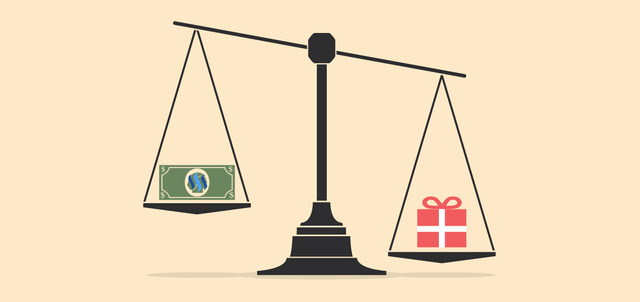
From the Wikipedia Page
A gift economy, gift culture, or gift exchange is a mode of exchange where valuables are not traded or sold, but rather given without an explicit agreement for immediate or future rewards. This contrasts with a barter economy or a market economy, where goods and services are primarily exchanged for value received. Social norms and custom govern gift exchange. Gifts are not given in an explicit exchange of goods or services for money or some other commodity.
Does Steem really work like this?
I'm aware that much of my experience on this platform is anecdotal. The value it may hold, the tips/tricks I can share may work for some people and may not for others. I do believe however we can all agree on some basic things about our platform, starting with the importance of building relationships.
An economy based on the context of relationships might sound a little too Utopian for those who enjoy shades of cynicism, but I happen to think that our virtual home does have this element built into its cogs. If this was intentional or not when it was designed may be a long conversation for another day, but to me the rise and proliferation of communities is sufficient proof of this fact.
Healthy Reciprocity
I'm choosing to add the word Healthy because its important to make this nuanced distinction. The reason why I chose to support someone has to be good, that user has to be someone who in my view is acting in an ethical manner, adding value to themselves by adding value to others.
This might be my favorite Zen paragraph that @luzcypher wrote:
Reciprocity is a curious thing. Being the first to give does not guarantee people will return the gesture, but being consistent with your support will eventually get noticed and attracts genuine support from others.
If you don't read it with careful intent you might miss the most important word in the whole paragraph: Guarantee
This might the reason why many who attempt this path struggle to do so, because they begin participating of the gift economy with a self imposed expectation. To give some examples of what I mean, to be more specific, let me attempt a short list:
- I always upvote @ungrateful user, He never upvotes me back.
- I think I've resteemed 2 posts of @ingratedude , he never resteemed one of mine.
- I stopped commenting on @snobdoucher's post, he never answers my questions.
I think my point becomes apparent, its obvious that the person with expectations acted with "kindness" with a condition of reciprocity, and that can't be what a healthy gift economy is all about.
The right Ethos
Is probably a combination of two systems, two economies. One that incentivizes users to bring value to other users of the platform, to curate, to spread their voting power around and not vote on themselves, to clean the platform with flags (those are needed too), etc, While also supporting a bartering economy that becomes fertile ground for entrepreneurship and commerce.
I must admit that writing that last paragraph was more difficult than I imagined, not because I was lacking words, but because of how complicated the mission seems to be. We are literally re-writing the book as we go. I guess time will tell and I'll look back at this post, at this somewhat confused thoughts wondering "What the hell was I thinking?".

Other posts by yours truly
• Our tiny pineapples
• Different puppets, same stupid game
• Some thoughts on our peaceful Revolution - Communities
• A tiny cardinal
• 2000 Follower Celebration Contest Results - Unicorn Galore Exposition Bonanza Palooza Event
I guess I have different considerations due to my account's stated mission, you're right, it would be nice to upvote those who have upvoted me the most in kind to repay them, but I think they themselves would prefer if I were to distribute it further outwards in whatever ways possible. As a whole system trickle down does not work, but there are definitely some people who could give less of a fuck about absolute maximization on steemit and I think without them the platform would be deader than dead.
Downvoting a post can decrease pending rewards and make it less visible. Common reasons:
Submit
You and I share many concerns, but I also suspect we are sticking around because we remain hopeful.
Downvoting a post can decrease pending rewards and make it less visible. Common reasons:
Submit
You have forced my hand, I am obliged to participate in this ruthless vote4vote scheme now. xD
And yes, I do like the aspect of extremely direct engagement with peoples and communities I don't get to see that often on other social media sites, which tend to be very geographically-specific.
Downvoting a post can decrease pending rewards and make it less visible. Common reasons:
Submit
I upvoted this comment for this specific reason.
Downvoting a post can decrease pending rewards and make it less visible. Common reasons:
Submit
Oh hey bro, thanks.
Downvoting a post can decrease pending rewards and make it less visible. Common reasons:
Submit
In its primary inception, Steem is the first cryptocurrency that applies Point of Stake(PoS). PoS means the more you have, the more you get. So, in its primary inception, Steem is a selfish economy. Not a gift / sharing economy.
As there are more and more bloggers, Steemit is moving to a gift / sharing economy. It's more of an initiative from the community collective.
Downvoting a post can decrease pending rewards and make it less visible. Common reasons:
Submit
That might be the simplest way of explaining it... i might quote you on this one.
Downvoting a post can decrease pending rewards and make it less visible. Common reasons:
Submit
Hello Meno! your ideas seem really accurate to me. I believe that we must act in accordance with our principles and values, and not according to what we want to obtain in return.
I think that doing what I like without having expectations about anyone, helps me to be in peace with myself and the others.
Downvoting a post can decrease pending rewards and make it less visible. Common reasons:
Submit
That is the key my friend, if not how are we supposed to enjoy anything.... if we are betraying our ourselves?
Downvoting a post can decrease pending rewards and make it less visible. Common reasons:
Submit
Now I need to find some reason to start @snobdoucher.
Downvoting a post can decrease pending rewards and make it less visible. Common reasons:
Submit
thats a good account, someone should buy it! hahaha
Downvoting a post can decrease pending rewards and make it less visible. Common reasons:
Submit
Wow! I was going to comment, but then got distracted by extremely well-written dissertations in the comments section that brought up many interesting points. Many of those points were extremely well-reasoned, some very valid considerations, but mostly ultimately flawed.
Which brings me back to your post about Luz’s philosophy.
As deeply ingrained as ‘taking’ is in our society, gifting is ultimately the best form of altruistic selfishness or as the Dalai Lama would say ‘selfish altruism,’ in that everything we put out does inevitably come back (often 100 fold). It just seems to be the way the universe works, despite our indoctrinated objections.
I find it hard not to fall into the traps you speak of, like @selfishprickuser not commenting on my post after I comment on their’s, nor even giving a response to my comments certainly pushes buttons overtime.
Does that mean I should cease commenting on their posts?
Yes, I probably shouldn’t comment on their posts anymore, but not because of lack of reciprocity or some form of parsimoniousness, but more because it’s clear that this person doesn’t wish to establish any form of relationship with me and there are plenty of others that do. After all, time is limited.
Although there’s a valid argument that could be made about commenting on other’s posts being important, because even if they don’t reply or comment back themselves, your comment (if it’s a good comment) will get noticed by others and can spark relationships with other people. (Just negated the point with a better reasoning. Lol)
There’s something I learned over the years about giving that must be made clear.
Like the understanding of yin-yang giving and receiving must be balanced.
Giving too much too often can cause a dysfunctional disbalance (a disturbance in the force), especially if the person doing the giving is not receptive to receiving.
Receiving is as vital in the process as giving.
Think about it.
If someone wishes to give me a compliment, “wow! You’re so incredibly talented! That was the best show I’ve ever seen!” but I deflect or reject the compliment, “thanks, but nah! I was shit!” Then I have robbed that person of the joy of giving. In that instance, I have inadvertently become a ‘taker’ under the guise of being a ‘giver’ simply because of a distorted or myopic view of receiving.
I’m all for a gifting economy.
In fact, I think it’s an inevitable future for our species, but it won’t work without a deep understanding of balance between giving and receiving.
Yet another thought provoking post. Love it mate!
Downvoting a post can decrease pending rewards and make it less visible. Common reasons:
Submit
I'm very acquainted with your philosophy and I'm lucky to call you a friend... Its hard to objective about this subject you know, at least for me.. because I can see both sides of the coin, I just prefer one over the other a lot more.
That being said, the answer as with many things probably lies in the middle in a balanced compromise...
Downvoting a post can decrease pending rewards and make it less visible. Common reasons:
Submit
Naaaw! Love you too mate.
I can see both sides of the coin too and I have to agree that it's always going to be better to lean, or rather, reach towards the positive utopian side of things because inevitably the negative indoctrinations out there pull the result back so that it falls short of the actual ideal...
That's how we get balance by shooting for total positive.
Downvoting a post can decrease pending rewards and make it less visible. Common reasons:
Submit